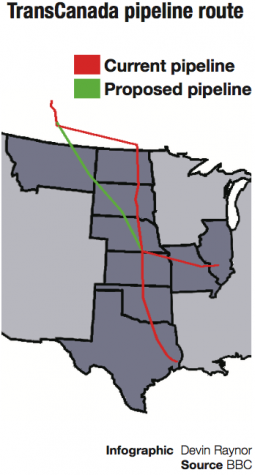Concern arises after TransCanada oil leakage
Oil companies losing public trust following spill
December 30, 2017
I n November, approximately 210,000 gallons of crude oil were spilled from the Keystone pipeline in South Dakota. The pipeline is owned by TransCanada Corporation which has already began cleaning up the spill.
n November, approximately 210,000 gallons of crude oil were spilled from the Keystone pipeline in South Dakota. The pipeline is owned by TransCanada Corporation which has already began cleaning up the spill.
The progress TransCanada has made in cleaning up the leakage does not excuse the fact that thousands of gallons of oil are still in the soil.
According to TransCanada, 44,400 gallons of oil have already been recovered as of Nov. 24. Although TransCanada has cleaned up almost a quarter of the spill, roughly 166,000 gallons of oil still remain in the ground.
TransCanada has released information to the public concerning the spill and said it’s carefully assessing the damage.
A plan to start repairs has already been approved by the Hazardous Materials Safety.
Although TransCanada has handled this incident very well, they have proposed to build another pipeline through the United States, the Keystone XL.
This project was approved by President Trump’s administration in March because the construction of the pipeline will generate more jobs.
However, these jobs will only be temporary and when the Keystone XL line is finished the workers will be left unemployed.
Furthermore, the Keystone XL line will carry oil made from oil sands that produce 17 percent more greenhouse gases.
The Keystone XL project will also cross the Ogallala Aquifer, one of the largest aquifers in the nation. According to Scientific American, the Ogallala Aquifer waters around $20 billion in food products a year and is very important for sustaining agriculture in the west.
If the Keystone pipeline were to leak, it would be disastrous. Although TransCanada has stated it would take the necessary precautions to minimize their impact of the environment, it is hard to trust the company after this last oil spill.
Many oil companies take precautions and use advanced technology to try and prevent oil spills.
However, with 1.3 million gallons of petroleum spilled in the United States, according to the Department of Energy, it’s becoming harder and harder to trust these new pipelines.
In Minnesota, the oil company Enbridge has proposed a new line that will cross native lands and water resources. If this project were to be passed, it’s hard to believe that an oil spill will not occur.
If a spill were to occur, like in South Dakota, it would harm Minnesota’s wildlife and land.
With so many spills happening this decade, it’s becoming more difficult to place trust in the oil companies building these new pipelines.



